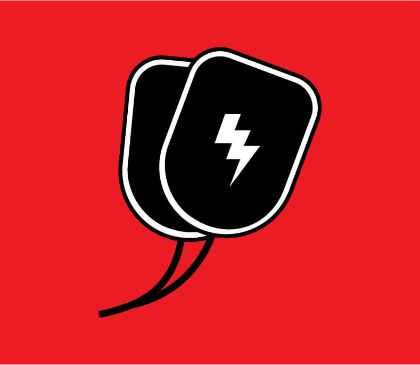5 Strategies to Prevent Heart Disease
- Feb 5, 2018

Heart disease remains the leading cause of death in the United States for both men and women.
In 2017, approximately 630,000 Americans died from heart disease — that’s nearly 1 in every 4 deaths (Medical News Today). In the United States, someone has a heart attack every 40 seconds! As advocates for CPR and AED training, heart health, and the prevention of sudden cardiac death, we find these statistics incredibly grim.
While you can’t control certain risk factors such as your age, family history, gender, race, or ethnicity, there are plenty of ways you can lead a heart-healthy lifestyle…and that’s what we’ll be focusing on this week.
5 Practical Ways You Can Prevent Heart Disease
#1 — Eat More Fiber (and Less Saturated Fat)
The iconic “Got Milk?” advertising campaign, which turned 25 this year, made drinking milk look downright sexy. But just because the decades-old campaign has decidedly more star power and cache than “Got Fiber?” or “Got Broccoli?” could ever hope for, that doesn’t mean they aren’t good ideas.
The American Heart Association recommends having a few meals without meat each week. By reducing your meat intake and upping your consumption of fruit, veggies, legumes, and whole grains, you’ll dramatically increase the amount of fiber in your diet while simultaneously reducing the number of saturated fats you ingest. It’s a win-win!
Yes, we realize that Thanksgiving is on the horizon and visions of turkey and cornbread and sausage stuffing are peppering your dreams. But we’re going to say that eating vegetarian meals (or, at the very least, meals with less meat) may help lower your cholesterol and reduce your risk of heart disease. (You’ll find that it’s easier on your grocery bill, too!)
If the notion of walking an entirely vegetarian path is too daunting, start by incorporating a meal or two a week in which meat plays a supporting role. Then, gradually work up to a few full-on vegetarian options. While the internet is a great place to start your journey towards a healthier menu, finding well-written and reliable recipes can be a challenge. We recommend visiting your local library and checking out a few titles. A few of our favorite veg-heavy and family-friendly cookbooks (translation: great for busy weeknights) include Ottolenghi Simple, Milk Street: Tuesday Nights, and A Modern Way to Cook.
#2 — Watch Your Weight
A few weeks ago we wrote about the relationship between obesity and sudden cardiac death in young people, but being overweight is a key risk factor for heart disease for people of all ages. Which is especially troubling, considering that 72% of Americans are either overweight or obese (Centers for Disease Control). Obesity can put you at risk for a myriad of health problems related to heart disease such as stroke, high blood pressure, and diabetes. If you’re worried about your weight, don’t hesitate to speak to your doctor or to contact a nutritionist to develop a plan of action.
Losing weight can be daunting, but here’s the good news: there’s scientific evidence that losing just 5% of your body weight can lower your cholesterol and blood pressure levels, decrease your risk of diabetes, help pave the way for a better night’s sleep, and reduce inflammation (Obesity Action Coalition).
#3 — Make a Promise to Yourself to Exercise More
New Federal physical activity guidelines released on earlier this week recommend that adults “…complete at least 150 minutes of moderate-intensity exercise or 75 minutes of vigorous activity every week, along with strength training twice a week. They also suggest balance training for older people and, for the first time, urge kids between the ages of 3 and 5 to be active for at least three hours a day, an acknowledgment that even small children run the risk of being too sedentary these days” (New York Times).
Staying active and fit can lower your blood pressure, help you lose or maintain your weight, lower your cholesterol, help control your blood sugar, and reduce your stress levels.
Okay, we all know why exercise is good for us, but only 1 in 5 adults and teens get enough exercise. Yikes!
If you’re sedentary, start by simply getting up more frequently and moving around. Invest in a pedometer, Fitbit, or step-counting app to help you achieve your fitness goals. Soon, you’ll find yourself taking the stairs, rather than the elevator and parking as far away from the entrance as possible. Every step counts, and you’ll be surprised at how quickly they add up!
Once you’ve hit your 10,000 steps-per-day goal, set your sites on some cardio and weight training. Make exercising social by going to a class at the gym or by enlisting a friend to work out or walk with you. If you’re the solitary sort, go for a meditative walk or run. Either way, be consistent but be willing cut yourself some slack; if there are days when fitting in 30 minutes of exercise seems impossible, try to fit in a few 10-minute exercise breaks throughout the day.
You may want to speak with your physician before starting an exercise program.
#4 — Read Labels
Who knew that reading was such a great strategy for preventing heart disease?! Following a heart-healthy diet means keeping a close eye on your sodium, sugar, and fat intake, since these are tied to heart disease risk factors like high blood pressure and high cholesterol. What better way to watch what you eat than to read the fine print?
Generally speaking, pre-packaged foods aren’t as healthy as meals and snacks that are prepared fresh from whole ingredients. While you’re paying attention to calories, fats, sodium, and sugar, be sure to keep an eye on serving sizes! Hint: beverages can be a surprising source of sugar and sodium. Eliminating soda, energy drinks, supermarket smoothies, and juices can do wonders for your daily calorie intake.
#5 — Get a Good Night’s Sleep
Poor sleep is tied to a number of risk factors for heart disease, including high blood pressure, stroke, diabetes, heart failure, and sleep apnea. For many, getting a good night’s sleep (that’s 7-9 hours for adults) is harder than it sounds. Invest in a white noise machine, avoid afternoon coffee runs and evening chocolate binges, turn off the TV, go to sleep at the same time every night, and avoid alcohol before bedtime.
Ready to promote heart-healthy choices and cardiac awareness at your workplace? Contact us to learn more about our blended or traditional CPR and First Aid training courses. Call our team at 800-544-0004 or email us at customerservice@cardiopartners.com.












 CALL US:
CALL US: